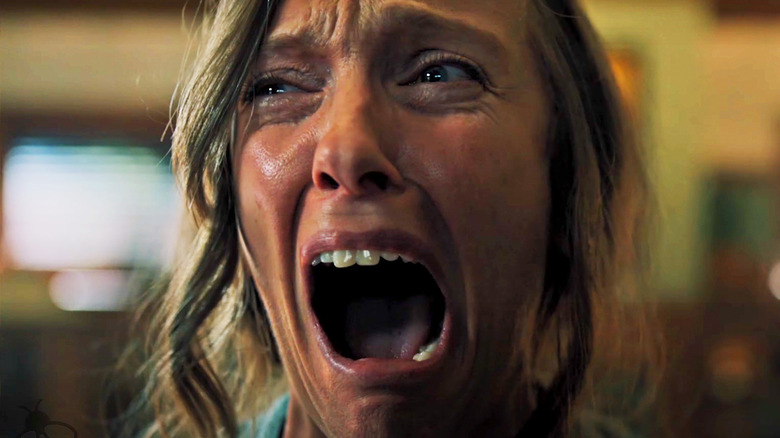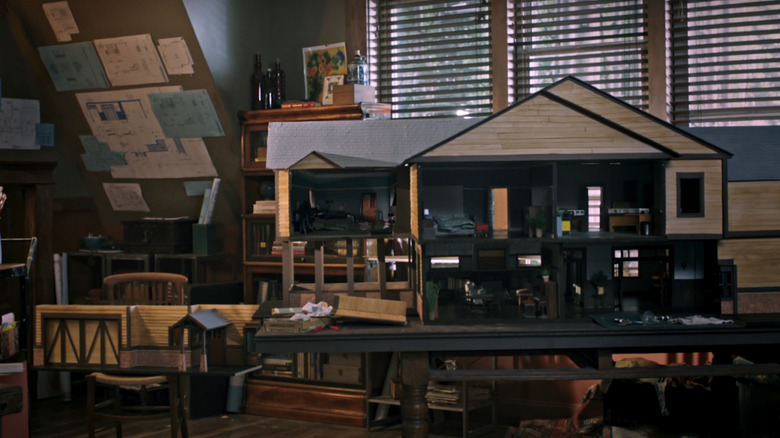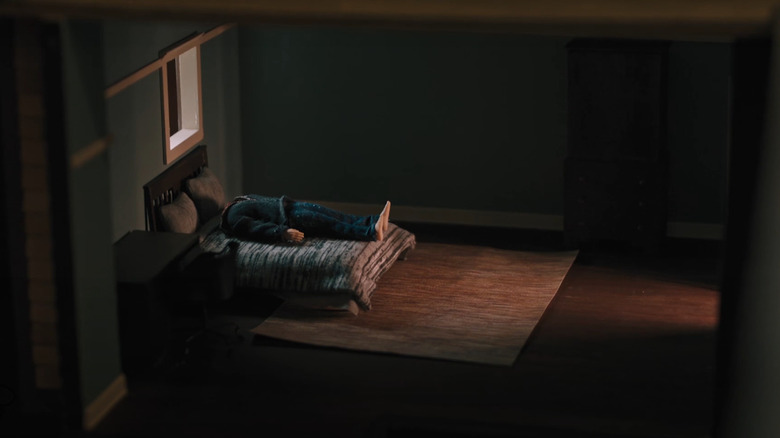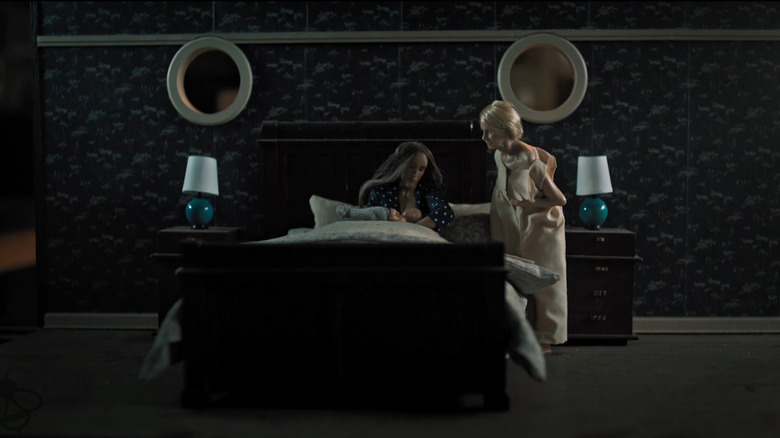Ari Aster Thinks Hereditary's Dollhouse Perfectly Set Up The Film
"Hereditary" opens on a shot of a treehouse seen through a window before an ominously slow pan around the room reveals a dollhouse sitting on a table. The camera dollies in to focus on a bedroom, which as it comes closer is shown to be an actual room, tracked onto the dollhouse with VFX. This opening sequence is at once unsettling and intriguing. What does the dollhouse have to do with anything? Well, according to director Ari Aster, it's an important metaphor for the film as a whole.
The filmmaker's 2018 psychological horror involves an exploration of grief and family dysfunction, signaling Aster's desire to make something unique with his debut feature while delivering arguably more effective and long-lasting scares than most out-and-out horror movies. Aster told NPR that while he embraces the genre with which he's been most closely associated, he initially pitched "Hereditary" as, "a family tragedy that curdles into a nightmare," describing how he, "wanted to make a film that took suffering seriously." That took the form of a family drama quickly descending into a supernatural nightmare of the occult, as unseen forces start to manipulate the lives of miniature designer Annie Graham (Toni Collette), her husband Steve (Gabriel Byrne), and their two children Peter (Alex Wolff) and Charlie (Milly Shapiro).
That switch to the supernatural is both a strength and a weakness for "Hereditary." The film's dénouement basically amounts to "it was a demon the whole time." Which, considering the movie's stark and affecting portrayal of family dysfunction and grief, feels like somewhat of a cop-out. But for Aster, the supernatural element was crucial as it defined the feeling of helplessness that was so integral to the movie's unnerving tone — making the dollhouse the perfect metaphor.
Dolls in a dollhouse
When "Hereditary" starts, Annie has recently lost her mother and is somewhat isolated from her family — preferring to spend time building dioramas than interacting with her husband and children. The miniatures depict moments from her life. A model of herself is shown breastfeeding a miniature baby while Annie's mother watches over the scene. A model of Peter is shown laying in bed, foreshadowing the aftermath of one of the movie's most infamous scenes in which Charlie suffers a gruesome accidental death. But beyond serving as a way to foreshadow events in the film, Annie's preoccupation with her models was a crucial part of establishing the theme of agency, or a lack thereof.
As Ari Aster told NPR, "It just struck me as a solid metaphor for the family's situation, which is that they're ultimately people without any agency. They are like dolls in a dollhouse, being manipulated by these outside forces." In the film, those outside forces are eventually revealed to be the demon Paimon and his cult of devoted followers who cause the destruction of Annie's family and contribute to the tonal terror of "Hereditary." In that sense, the central characters are, like the miniatures, completely controlled by a larger presence, helpless to change their situation.
To enhance that sense of the family as "dolls in a dollhouse," Aster went beyond using the physical dollhouse as a metaphor and, as he told Moviemaker, tried to, "make the characters look and feel like dolls in a dollhouse." A big part of that involved shooting all the scenes in the main house on custom-built sets with movable walls. This allowed Aster and his Director of Photography, Pawel Pogorzelski to shoot wider than they would otherwise, evoking the feel of the dollhouse even while shooting full-scale scenes.
Fake Reality
As with Midsommar, Ari Aster's second feature, "Hereditary," feels so well executed it seems as though the director had it all planned out going in. Which he kind of did. But building the custom sets was actually a practical solution to scouting problems. As the director relayed to Moviemaker:
"After a couple of months of unsuccessful scouting for a location that would cater to the shot list, we finally decided to build all the interiors ourselves, from scratch. [Production Designer Grace Yun] and I designed and customized everything for this, from the paneling, to the wallpaper, to the wooden floors. The exterior of the house is an actual location in Salt Lake City, Utah, but every interior — the bottom floor, second floor, attic, and interiors of both a smaller tree house and a larger tree house for our final scene — were all built on a stage."
Watching the film, you wouldn't be able to tell the house scenes were shot on a soundstage. Yun did a fantastic job of making the home feel lived in while living up to Aster's desire for the whole thing to feel slightly artificial and dollhouse-esque. The meticulously-designed interiors are basically indistinguishable from a real home, which when mixed with Aster and Pawel's distancing effects and ultra-wide shots, creates this tension between artifice and reality that, as well as playing up the dollhouse metaphor, adds a subtle feeling of unease to the whole thing.
A sinister, knowing perspective
Ari Aster pushed that unease by simultaneously keeping the audience in the dark about the larger forces at play while letting them know something was seriously wrong from the outset. Hereditary doesn't start on a light note before things go awry. From the moment the camera pans to the dollhouse in the opening sequence, you know something is wrong. As Aster told Variety, "Ultimately we are with the family in their ignorance of what's really happening. But I also wanted to imbue the film with this sinister, more knowing perspective. Even though we are with the family in their ignorance, the movie itself knows exactly where the story is going."
As things progress, the family becomes increasingly manipulated by forces outside their control, bringing the dollhouse metaphor into stark relief. And even though we as the audience have known something is up, it makes it no less horrifying to watch the characters disintegrate. In that sense, the supernatural element of the story is part of what makes "Hereditary" so powerfully effective. The whole thing is basically one inexorable march towards oblivion, as darkness envelops a tragedy-plagued family while they hopelessly try to navigate their fate. The end is so bleak you can't help but be disturbed long after viewing.
Would it have been better if the dollhouse symbolized the way in which grief lives with you and dictates much of your life — turning you into nothing more than a doll manipulated by your own overwhelming emotion in the wake of losing someone? For me, that would add a whole extra dimension and could be even more effective than the secret cult/demon possession plotline. But that doesn't fully undermine the power of "Hereditary," which remains one of the most brilliantly upsetting horror efforts of recent years.



